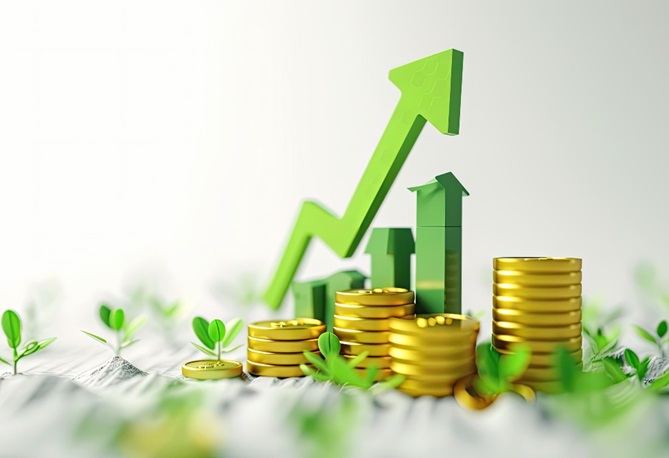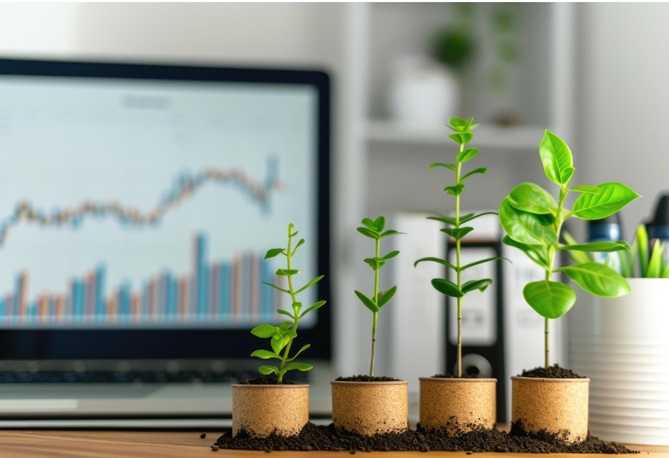"Green Portfolio": ethical and profitable investment
In our article, we look at market trends and ways to properly ‘green’ your portfolio
</p>

YEREVAN, 2 October. ARKA. The deteriorating environment is causing companies, governments and institutional market players to focus on the principles of sustainable development. Nations around the world are developing renewable energy to reduce the effects of harmful emissions. Consumer awareness about environmental issues is also increasing, which is reflected in their demands.
Because of the trend towards sustainability, the market share and importance of green companies is increasing. Even investors, for whom the ethical side of business is not a top priority, should take this into account in their strategy.
In our article, we look at market trends and ways to properly ‘green’ your portfolio.
What is ‘green investment’?
‘Green’ investment - investing in environmentally friendly projects - is one of the aspects of the ESG concept. It consists in supporting businesses that improve the state of nature and society. The main principles are ‘encoded’ in the abbreviation: E - Environmental (care for the environment), S - Social (development of society), G - Governance (ethical management, transparency of schemes, respect for employees).
‘Green’ investing is considered not only socially responsible, but also potentially profitable. Firstly, green companies tend to operate in the largest sectors: agriculture, technology, industry. Secondly, the world's leading economies encourage green business with subsidies and tax incentives, so its popularity and profitability is growing.
So, by choosing green companies, you are investing in a rapidly growing and promising field.

Current trends in the green market today
1. Renewable energy sources:
Major emerging markets (China, India, Brazil) are moving towards a transition to renewable energy. Specialised plants are being built, the need for technology and equipment is increasing, new jobs are being created and economic activity is growing.
The main renewable sources are solar and wind energy. As the International Energy Agency expects, their volume will more than double compared to 2022.
Another important area is bioenergy. In 2023, 50 per cent of renewable energy was derived from plant materials and residues. The International Energy Agency predicts that geothermal energy will also gain popularity by 2026.
By 2021, more than 17% of the world's energy supply was provided by hydropower. Growth has slowed since then, but the field retains great potential, continuing to grow through innovation and expansion in different regions of the world.
2. electric vehicles
The global automotive industry is moving away from traditional internal combustion engines and focusing on electric vehicles. For example, Volvo and GM have stated that they plan to produce only electric models by the mid-2030s.
The European Commission in 2023 said it aims to achieve a 55 per cent reduction in greenhouse gases by the end of the decade.
BloombergNEF forecasts that by 2040 electric cars will account for 58% of global passenger car sales.
3. CCUS - technologies that enable the management of carbon emissions: capture, disposal, utilisation and storage.

Which products are worth paying attention to?
Switching to solar and wind energy requires specialised batteries. BloombergNEF forecasts that the global storage market will grow sixfold between 2020 and 2030. The most important innovations in this field are solid-state batteries, which are characterised by increased safety and alternative chemical composition.
Developments in the modernisation of power grids are also playing a major role: improved metering, dynamic load management.
In the hydropower sector, technologies to increase the capacity of dams, low head and variable speed turbines are in demand.
How do you put together an ‘eco-friendly briefcase’?
There are several ways to do this:
- Invest directly in shares of green companies, such as those producing renewable energy technologies or electric cars;
- buy bonds designed to finance green projects;
- invest in a green company token. This is a digital unit that replaces securities and similarly captures the investor's right to a share of the profits;
- buy a stake in an ETF fund that selects issuers with high ESG, i.e. those committed to sustainable development. An example of such a fund is the Global ESG Select Stock Fund (VEIGX).
The paradoxes of green investing
Green investing is characterised by a number of nuances.
- ESG fund managers choose stocks of companies not related to environmental technologies. Preference is given to large IT corporations and pharmaceutical companies. Their high ESG is largely based on management principles. IT and pharmaceutical companies have a very small share of physical labour. Accordingly, there are fewer cases of employee rights violations than in the industrial sector.
- There is no unified approach for assessing environmental friendliness. The country's regulators can develop their own certification system or rely on the principles of international associations (including the International Capital Market Association and the Climate Bonds Initiative).
Rating and analytical agencies compile ESG ratings, but often differ in criteria and final scores.
- Not all companies that claim to be environmentally friendly are actually doing a good job of preserving the environment. They promise, for example, to develop renewable energy sources or reduce emissions through new technologies, but they implement dubious schemes in these areas.

As a conclusion, let us emphasise the main point:
‘Green investments’ are investments in companies that directly or indirectly combat environmental problems.
‘Green business is aimed at the conservation and reasonable consumption of natural resources. The greatest investment potential is in areas such as the production of alternative energy sources and environmentally friendly vehicles.
There is no single principle for assessing environmental friendliness. Therefore, when selecting issuers, it is necessary to thoroughly research companies, relying on various sources: ESG-fund lists, experts‘ opinions, national stock exchanges’ assessments.
This article is prepared within the framework of the joint project ‘Year of Investing in Oneself’ by ARKA and AMI Novosti-Armenia news agencies and Freedom Broker Armenia.


